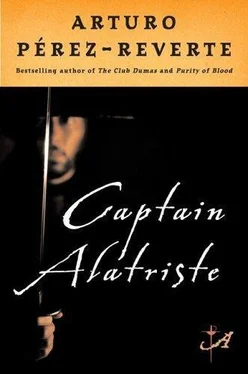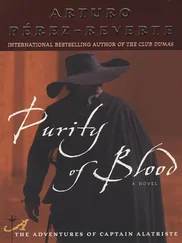Arturo Perez-Reverte - Captain Alatriste
Здесь есть возможность читать онлайн «Arturo Perez-Reverte - Captain Alatriste» весь текст электронной книги совершенно бесплатно (целиком полную версию без сокращений). В некоторых случаях можно слушать аудио, скачать через торрент в формате fb2 и присутствует краткое содержание. Жанр: Старинная литература, на английском языке. Описание произведения, (предисловие) а так же отзывы посетителей доступны на портале библиотеки ЛибКат.
- Название:Captain Alatriste
- Автор:
- Жанр:
- Год:неизвестен
- ISBN:нет данных
- Рейтинг книги:3 / 5. Голосов: 1
-
Избранное:Добавить в избранное
- Отзывы:
-
Ваша оценка:
- 60
- 1
- 2
- 3
- 4
- 5
Captain Alatriste: краткое содержание, описание и аннотация
Предлагаем к чтению аннотацию, описание, краткое содержание или предисловие (зависит от того, что написал сам автор книги «Captain Alatriste»). Если вы не нашли необходимую информацию о книге — напишите в комментариях, мы постараемся отыскать её.
Captain Alatriste — читать онлайн бесплатно полную книгу (весь текст) целиком
Ниже представлен текст книги, разбитый по страницам. Система сохранения места последней прочитанной страницы, позволяет с удобством читать онлайн бесплатно книгу «Captain Alatriste», без необходимости каждый раз заново искать на чём Вы остановились. Поставьте закладку, и сможете в любой момент перейти на страницу, на которой закончили чтение.
Интервал:
Закладка:
"Do not ever forget that man or this day," the captain said, giving me an affectionate rap on the spot where Lope had touched me.
And I never forgot. Still today, so many years later, I put my hand to the crown of my head and feel the affectionate touch of the Phoenix of Geniuses. All of them—he, Don Francisco de Quevedo, Velazquez, Captain Alatriste, the miserable and magnificent epoch I knew—all are gone now. But in libraries, in books, on canvases, in churches, in palaces, streets, and plazas, those men left an indelible mark that lives on. The memory of Lope's hand will disappear with me when I die, as will Velazquez's Andalusian accent, the sound of Don Francisco's golden spurs jingling as he limped along, the serene gray-green gaze of Captain Alatriste. Yet the echoes of their singular lives will resound as long as that many-faceted country, that mix of towns, tongues, histories, bloods, and betrayed dreams exists: that marvelous and tragic stage we call Spain.
Neither have I forgotten what happened a little later. The hour of the Angelus was approaching and San Felipe was still buzzing when, just in front of the small shops below, I saw a carriage pull to a stop—a carriage I knew very well. I had been leaning on the railing of the steps, a little separated from my elders but close enough to hear what they were saying.
The eyes looking up—at me—seemed to reflect the color of the magnificent sky far above our heads. They were so blue that everything around me except that color, that sky, that gaze, evaporated from my consciousness. It was like a delectable torment of blueness and light, a lagoon that was impossible to pull myself from. If I am to die someday—I thought at that instant—this is how I want to die: drowning in that color. I eased a little farther away from the group and slowly went down the stairs, almost as if I had no will of my own, or had swallowed a philter brewed by Hypnos.
And as I walked down the San Felipe steps to Calle Mayor, I could feel upon me—for an instant, like a flash of lucidity in the midst of my rapture, from thousands of leagues away—the worried eyes of Captain Alatriste.
X. EL PRINCIPE CORRAL
I fell right into the trap. Or to be more exact, five minutes of conversation was all it took for them to bait it. Even now, after so many years, I want to believe that Angelica de Alquezar was just a girl manipulated by her elders, but not even knowing her as I later knew her can I be sure. Always, to the day of her death, I sensed in her something that no one can learn from another person: an evil, cold wisdom that you see in some women from the time they are girls. Even before that; perhaps for centuries. Deciding who was truly responsible for all that followed is another matter, one that would take a while to analyze, and this is not the place or time. We can sum it up by saying, for now, that of the weapons that God and nature gave woman to defend herself from the stupidity and baseness of man, Angelica de Alquezar had far more than her share.
The afternoon of the next day, on the way back from El Principe theater, I was remembering her as I had seen her the previous day at the window of the black carriage stopped beneath the steps of San Felipe. Something had struck a false note, as when, in a musical performance that seems perfect, you detect an uncertain chord. All I had done was go over and exchange a few words, enchanted by her mysterious smile and golden curls. Without getting out of the carriage, while her chaperone was occupied in purchasing a few items in the little shops and the coachman seemed absorbed with his mules—that alone should have put me on guard—Angelica de Alquezar again had thanked me for my help in scattering the ragamuffins on Calle Toledo, asked me how I was getting along with my Captain Batiste, or Triste, and inquired about my life and my plans. I strutted a little, I confess. Those wide blue eyes that seemed to take an interest in everything I was saying prodded me to say more than I should have. I spoke of Lope, whom I had just met on the steps, as if he were an old friend. And I mentioned my intention to attend El Arenal of Seville, the play being performed the next day at El Principe. We chatted a bit, I asked her name, and after hesitating a delicious instant, tapping her lips with a small fan, she told me.
"Angelica comes from 'angel,'" I commented, enslaved. She looked at me with amusement and said nothing for a long while. I felt as if I had been transported to the gates of Paradise. Then her chaperone returned, the coachman caught sight of me, slapped the reins, drove off, and I was left standing there, frozen among the passing parade, feeling as though I had been brutally ripped from some magical place.
Only later that night, when I could not sleep for thinking of her, and the next day on the way back from the theater, did some peculiar details occur to me. No well-brought-up girl was permitted to chat, right in plain sight, with young nobodies she scarcely knew. I began to sense that I was teetering on the brink of something dangerous and unknown. I even asked myself whether Angelica's attention to me could have been connected with the eventful hours of some nights earlier. However you looked at it, any relation between that blonde angel and the ruffians at the Gate of Lost Souls seemed unimaginable. Added to that, the prospect of attending a play by Lope had clouded my judgment. And that, says the Turk, is how God blinds those He wants to go astray.
From the monarch to the lowest townsman, in the Spain of Philip the Fourth, everyone had a burning passion for theater. The comedias had three jornadas, or acts, and were written in verse, in several meters and rhymes. Their hallowed authors, as we have seen in the case of Lope, were loved and respected, and the popularity of the actors and actresses was enormous. Every premiere or performance of a famous work brought out town and court, and through the nearly three hours each play lasted, the audience was in thrall. At that time, the productions usually took place in daylight, in the afternoon after the midday meal, in open-air venues know as corrales. There were two in Madrid: El Principe, also known as La Pacheca, and La Cruz. Lope preferred the stage of the latter, which was also the favorite of our lord and king, who loved the theater as much as his wife, Elizabeth of France, did. And just as much as our monarch loved theater, being especially fond of youthful adventures, he also loved, clandestinely, the beautiful actresses of the moment—chief among them Maria Calderon, or La Calderona, who gave him a son, the second Don Juan of Austria.
Expectation was high that day. One of Lope's celebrated comedias was playing at El Principe! Long before it started, animated groups of theatergoers were wending their way toward the corral, and by noon the narrow street on which it was then located—across from the convent of Santa Ana—was already crowded. The captain and I had met Juan Vicuna and Licenciado Calzas along the way; they, too, were great admirers of Lope's, and Don Francisco de Quevedo had joined us on the same street. So we all went on together to the gate of the theater, where it became nearly impossible to move among the crowd. Every level of society was represented: The elite occupied the boxes overlooking the stage and the benches and standing room for the public, while those further down the social ladder filled the tiers below the boxes and the wooden benches in the yard. Women sat in their own gallery, the cazuekv, the sexes were separated in the corral as in church. And behind a dividing barrier, the open yard was reserved for those who stood throughout the play: the famous mosqueteros, there with their spiritual leader, the cobbler Tabarca. When he passed our group he greeted us gravely, solemnly, puffed up with his own importance.
Читать дальшеИнтервал:
Закладка:
Похожие книги на «Captain Alatriste»
Представляем Вашему вниманию похожие книги на «Captain Alatriste» списком для выбора. Мы отобрали схожую по названию и смыслу литературу в надежде предоставить читателям больше вариантов отыскать новые, интересные, ещё непрочитанные произведения.
Обсуждение, отзывы о книге «Captain Alatriste» и просто собственные мнения читателей. Оставьте ваши комментарии, напишите, что Вы думаете о произведении, его смысле или главных героях. Укажите что конкретно понравилось, а что нет, и почему Вы так считаете.










